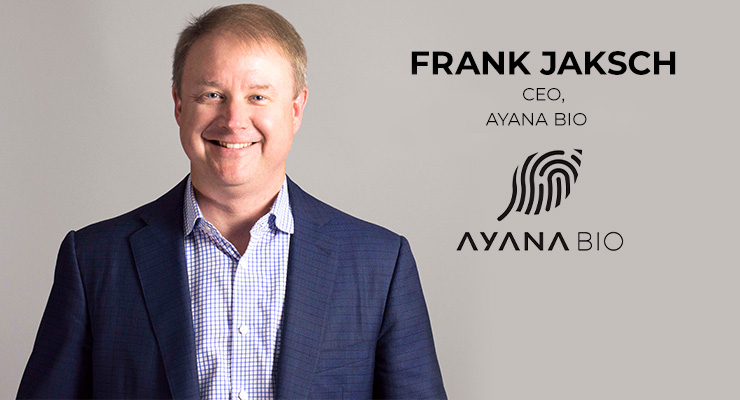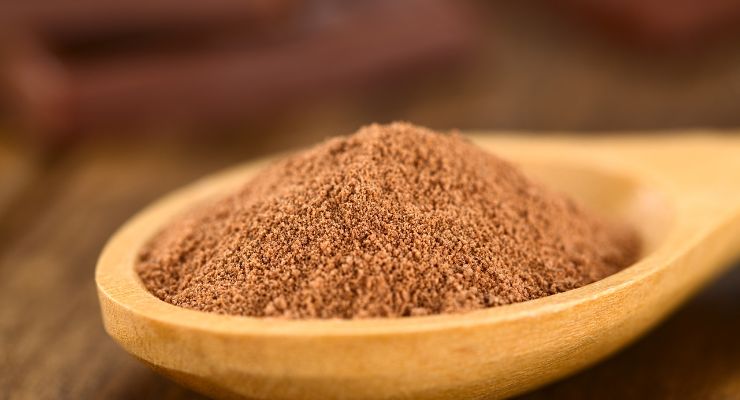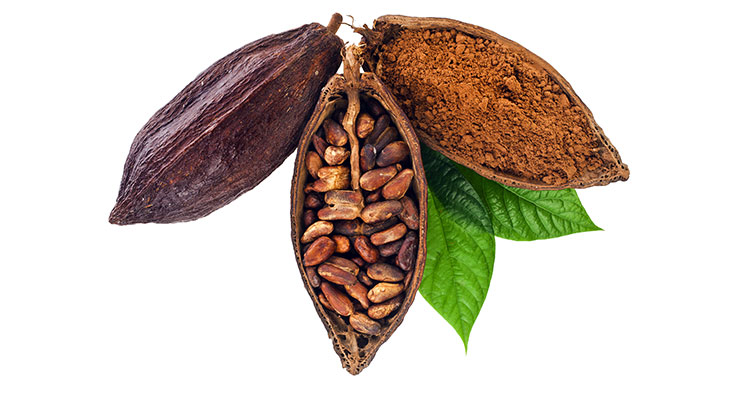By Mike Montemarano, Associate Editor02.27.23
What if the health-promoting bioactives found in common herbs and botanicals could be produced without a square inch of soil?
Ayana Bio is setting a path to do just that, focusing on several high-yield bioactive ingredients that face production and sustainability challenges. In Sanskrit, “Ayana” can be interpreted as “good path.” In Swahili, “Ayana” is said to mean “beautiful flower.”
The company formed as a spinoff from Boston-based Ginkgo Bioworks (NYSE: DNA), a synthetic biology platform founded in 2008 by MIT scientists.
“Ginkgo Bioworks was launched to make bioengineering faster, cheaper, and easier across industries and applications through its cell programming platform,” said Frank Jaksch, who was appointed CEO of Ayana Bio in late 2022. “Through its partnership, Ayana Bio uses Ginkgo’s cell programming platform to rapidly analyze thousands of plant cell lines and find the highest-quality starting points for bioactives.”
Jaksch is the founder, present board member, and former CEO of ChromaDex, the company behind the NAD-boosting dietary supplement Tru Niagen. He has spent more than 25 years in various roles within the food, beverage, and dietary supplements space, and also sits on the board of the Natural Products Association (NPA).
The company will utilize Ginkgo’s cell culture technologies to develop plant and fungal bioactives quickly and at scale. The company said it is pioneering “a new way to create nature-identical complex molecules as mixtures, or single compounds.”
Ultimately, applications can include food and beverage, dietary supplement, medical food, traditional medicine, and companion animal products.
“Ayana Bio grows plants without growing plants in the ground,” said Jaksch. “Through collaborations with global industry leaders in consumer packaged goods brands, supplements, specialized nutrition, over-the-counter, and traditional medicines, Ayana Bio will create a new way to sustainably deliver plant bioactive ingredients that give consumers confidence in quality and reliability while preserving the planet.”

“These plant cells are propagated from real plants, similarly to stem cells, and assessed throughout the cell cultivation process for important characteristics like bioactive potency, stability, and purity. Ayana Bio further hones in on the ideal plant cell line for standardized quality and then provides the nutrients the plant cells need to multiply. This process is similar to brewing beer, but instead of growing yeast or bacteria, Ayana Bio grows plants directly from their cells.”
“By providing these cells with carbon sources, oxygen, vitamins, and minerals, Ayana Bio produces the same plant biomass but without the plant itself,” he continued. “A few weeks later, the plant cell is fully propagated, and we harvest it to be used as an ingredient for health and wellness products.”
Ayana Bio has also appointed Weslee Glenn as its head of platform development. Previously, Glenn directed metabolic engineering at Provivi, a biotechnology company specializing in sustainable pest control. Troy Rhonemus was also recently appointed as the company’s head of commercial operations, following a tenure which included various positions at Pendulum Therapeutics, Bolt Threads, ChromaDex, and Cargill.
“Imagine a world where a plant like ginseng, which takes five to seven years to grow in the ground, could be ready to go in a couple of weeks with plant cell cultivation,” Jaksch said, noting this new cultivation method bypasses several limitations found in conventional collection, as well as risks related to quality and economic adulteration.
“The limits of our natural resources lead to shortcuts on sustainability, purity, safety, and hygiene when it comes to sourcing ingredients. Botanical biomass cost skyrockets because of scarcity. This will always lead to economic adulteration and fraud,” he said.
“In this controlled environment, factors found in a traditional field setting such as climate, soil properties, pesticides, water contamination, etc. have no effect on bioactive production,” Jaksch added. “Each production batch is identical to each other and identical to the molecular biomass makeup found in plants grown in the ground. Our technology can produce products that are more consistent and affordable, while leaving our natural resources alone.”
The cells that are cultured are already genetically programmed to produce the bioactives of interest, and don’t need to be engineered, the company said.
“Also, there’s a synergistic benefit in the unique cocktail of molecules present in plants that can’t be replicated with a single phytochemical or phytonutrient alone ... Plant cell cultivation can reproduce the ensemble of compounds of the plants found in nature,” said Jaksch.
“There’s a clear business need to replace current supply chains with more sustainable, standardized forms of production as soon as possible. Producing the full plant mixture allows Ayana Bio to start making an impact on current consumer products right away, rather than investing in years of R&D and clinical research needed to support isolated individual molecules.”

Upon securing partnerships with external partners such as CPG companies, Ayana Bio will be able to scale the bioactives it’s already producing. Presently, the biggest obstacle for this segment of ingredient production has been a lack of collaboration between CPG companies and ingredient companies that have come up with novel forms of production, Jaksch said.
Now on the path toward commercializing its products, Ayana has pledged $3 million to accelerate the production of its cacao bioactives to begin developing ingredients to support digestion, cardiovascular health, cognition, immunity, a healthy inflammatory response, and blood sugar management. Jaksch said the company is prepared to commercialize its cacao polyphenols by late 2024.
The motive for expediting its cacao bioactives is to create a product divorced from unsustainable harvesting methods, child labor, farmer poverty, pests, deforestation, and climate change. The optimized cell lines will be inexpensively produced in comparison to traditional cacao harvesting practices, according to the company.
While plant cell cultivation is more cost-effective in many instances, that isn’t always the case.
“Ayana Bio is the only company to use high throughput synthetic biology capabilities like sequencing, omics technology, and analytical chemistry to select the best plant cell lines at a massive speed and scale. This improved cell line and process helps us reduce the cost curve even further,” said Jaksch. “More importantly, plant cell cultivation avoids the costly human and environmental toll of overharvesting and unethical procurement.”

However, some experts believe a recent recommendation from the Academy of Nutrition and Dietetics (AND) may serve as a turning point in the conversation. AND now recommends a daily dose of 400-600 mg of flavan-3-ols, the most highly-consumed class of flavonoids, from food sources to support cardiometabolic health.
Jaksch noted that establishing DRIs for key bioactives, and FDA allowing for enforcement discretion on health claims for bioactives, such as its recent decision on cocoa flavanols, is a major step in the right direction.
“Ayana Bio is invested in raising awareness around daily recommended intakes for plant bioactives. We are focused on expanding partnerships with CPG companies to ensure they have the ingredients necessary to formulate more nutritious products for consumers,” Jaksch said. “Established DRIs for any key bioactives or nutrients help CPG companies with appropriately labeling their products, and should go a long way in supporting health claims, and ‘healthy’ or ‘natural’ label claims.”
Ayana Bio is setting a path to do just that, focusing on several high-yield bioactive ingredients that face production and sustainability challenges. In Sanskrit, “Ayana” can be interpreted as “good path.” In Swahili, “Ayana” is said to mean “beautiful flower.”
The company formed as a spinoff from Boston-based Ginkgo Bioworks (NYSE: DNA), a synthetic biology platform founded in 2008 by MIT scientists.
“Ginkgo Bioworks was launched to make bioengineering faster, cheaper, and easier across industries and applications through its cell programming platform,” said Frank Jaksch, who was appointed CEO of Ayana Bio in late 2022. “Through its partnership, Ayana Bio uses Ginkgo’s cell programming platform to rapidly analyze thousands of plant cell lines and find the highest-quality starting points for bioactives.”
Jaksch is the founder, present board member, and former CEO of ChromaDex, the company behind the NAD-boosting dietary supplement Tru Niagen. He has spent more than 25 years in various roles within the food, beverage, and dietary supplements space, and also sits on the board of the Natural Products Association (NPA).
The company will utilize Ginkgo’s cell culture technologies to develop plant and fungal bioactives quickly and at scale. The company said it is pioneering “a new way to create nature-identical complex molecules as mixtures, or single compounds.”
Ultimately, applications can include food and beverage, dietary supplement, medical food, traditional medicine, and companion animal products.
“Ayana Bio grows plants without growing plants in the ground,” said Jaksch. “Through collaborations with global industry leaders in consumer packaged goods brands, supplements, specialized nutrition, over-the-counter, and traditional medicines, Ayana Bio will create a new way to sustainably deliver plant bioactive ingredients that give consumers confidence in quality and reliability while preserving the planet.”

From Identification to Harvest
Jaksch discussed the steps involved in cultivating bioactive ingredients. “Ayana Bio’s technology starts by identifying the best plant cell lines, just like traditional breeding,” he said.“These plant cells are propagated from real plants, similarly to stem cells, and assessed throughout the cell cultivation process for important characteristics like bioactive potency, stability, and purity. Ayana Bio further hones in on the ideal plant cell line for standardized quality and then provides the nutrients the plant cells need to multiply. This process is similar to brewing beer, but instead of growing yeast or bacteria, Ayana Bio grows plants directly from their cells.”
“By providing these cells with carbon sources, oxygen, vitamins, and minerals, Ayana Bio produces the same plant biomass but without the plant itself,” he continued. “A few weeks later, the plant cell is fully propagated, and we harvest it to be used as an ingredient for health and wellness products.”
Ayana Bio has also appointed Weslee Glenn as its head of platform development. Previously, Glenn directed metabolic engineering at Provivi, a biotechnology company specializing in sustainable pest control. Troy Rhonemus was also recently appointed as the company’s head of commercial operations, following a tenure which included various positions at Pendulum Therapeutics, Bolt Threads, ChromaDex, and Cargill.
‘In this controlled environment, factors found in a traditional field setting such as climate, soil properties, pesticides, water contamination, etc. have no effect on bioactive production. Each production batch is identical to each other and identical to the molecular biomass makeup found in plants grown in the ground. Our technology can produce products that are more consistent and affordable, while leaving our natural resources alone.’
Bypassing Limitations
Many of the plants and bioactives Ayana intends to focus on are high in demand, and face sustainability challenges. The company has mentioned ginseng, berries, cocoa, echinacea, saffron, and ginger as the first botanicals of interest for sourcing and scaling complex and rare molecules.“Imagine a world where a plant like ginseng, which takes five to seven years to grow in the ground, could be ready to go in a couple of weeks with plant cell cultivation,” Jaksch said, noting this new cultivation method bypasses several limitations found in conventional collection, as well as risks related to quality and economic adulteration.
“The limits of our natural resources lead to shortcuts on sustainability, purity, safety, and hygiene when it comes to sourcing ingredients. Botanical biomass cost skyrockets because of scarcity. This will always lead to economic adulteration and fraud,” he said.
“In this controlled environment, factors found in a traditional field setting such as climate, soil properties, pesticides, water contamination, etc. have no effect on bioactive production,” Jaksch added. “Each production batch is identical to each other and identical to the molecular biomass makeup found in plants grown in the ground. Our technology can produce products that are more consistent and affordable, while leaving our natural resources alone.”
The cells that are cultured are already genetically programmed to produce the bioactives of interest, and don’t need to be engineered, the company said.
“Also, there’s a synergistic benefit in the unique cocktail of molecules present in plants that can’t be replicated with a single phytochemical or phytonutrient alone ... Plant cell cultivation can reproduce the ensemble of compounds of the plants found in nature,” said Jaksch.
“There’s a clear business need to replace current supply chains with more sustainable, standardized forms of production as soon as possible. Producing the full plant mixture allows Ayana Bio to start making an impact on current consumer products right away, rather than investing in years of R&D and clinical research needed to support isolated individual molecules.”

The Path to Commercialization
Ayana Bio launched with $30 million in Series A funding provided by Viking Global Investors and Cascade Investment. The two investment firms were working with The Ferment Consortium, a private investment vehicle for funding Ginkgo spinout companies.Upon securing partnerships with external partners such as CPG companies, Ayana Bio will be able to scale the bioactives it’s already producing. Presently, the biggest obstacle for this segment of ingredient production has been a lack of collaboration between CPG companies and ingredient companies that have come up with novel forms of production, Jaksch said.
Now on the path toward commercializing its products, Ayana has pledged $3 million to accelerate the production of its cacao bioactives to begin developing ingredients to support digestion, cardiovascular health, cognition, immunity, a healthy inflammatory response, and blood sugar management. Jaksch said the company is prepared to commercialize its cacao polyphenols by late 2024.
The motive for expediting its cacao bioactives is to create a product divorced from unsustainable harvesting methods, child labor, farmer poverty, pests, deforestation, and climate change. The optimized cell lines will be inexpensively produced in comparison to traditional cacao harvesting practices, according to the company.
While plant cell cultivation is more cost-effective in many instances, that isn’t always the case.
“Ayana Bio is the only company to use high throughput synthetic biology capabilities like sequencing, omics technology, and analytical chemistry to select the best plant cell lines at a massive speed and scale. This improved cell line and process helps us reduce the cost curve even further,” said Jaksch. “More importantly, plant cell cultivation avoids the costly human and environmental toll of overharvesting and unethical procurement.”

Bringing Bioactives into the Mainstream
While clinical research has shown many plant bioactives offer human health benefits, they do not have dietary reference intakes (DRIs) established, which are central on nutrition facts and supplement facts panels.However, some experts believe a recent recommendation from the Academy of Nutrition and Dietetics (AND) may serve as a turning point in the conversation. AND now recommends a daily dose of 400-600 mg of flavan-3-ols, the most highly-consumed class of flavonoids, from food sources to support cardiometabolic health.
Jaksch noted that establishing DRIs for key bioactives, and FDA allowing for enforcement discretion on health claims for bioactives, such as its recent decision on cocoa flavanols, is a major step in the right direction.
“Ayana Bio is invested in raising awareness around daily recommended intakes for plant bioactives. We are focused on expanding partnerships with CPG companies to ensure they have the ingredients necessary to formulate more nutritious products for consumers,” Jaksch said. “Established DRIs for any key bioactives or nutrients help CPG companies with appropriately labeling their products, and should go a long way in supporting health claims, and ‘healthy’ or ‘natural’ label claims.”




























